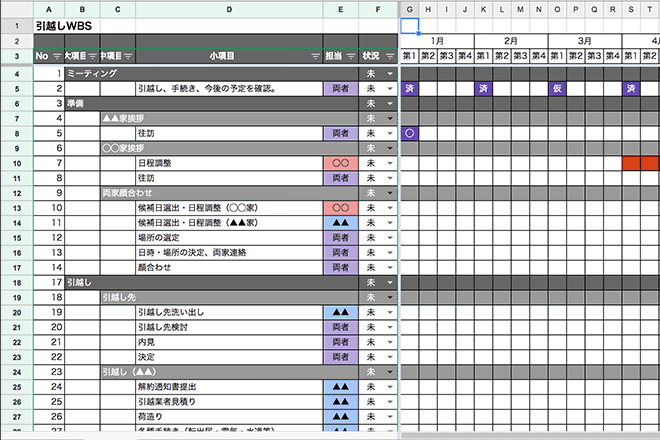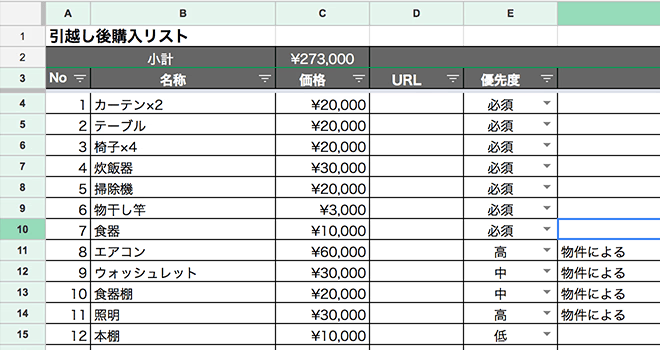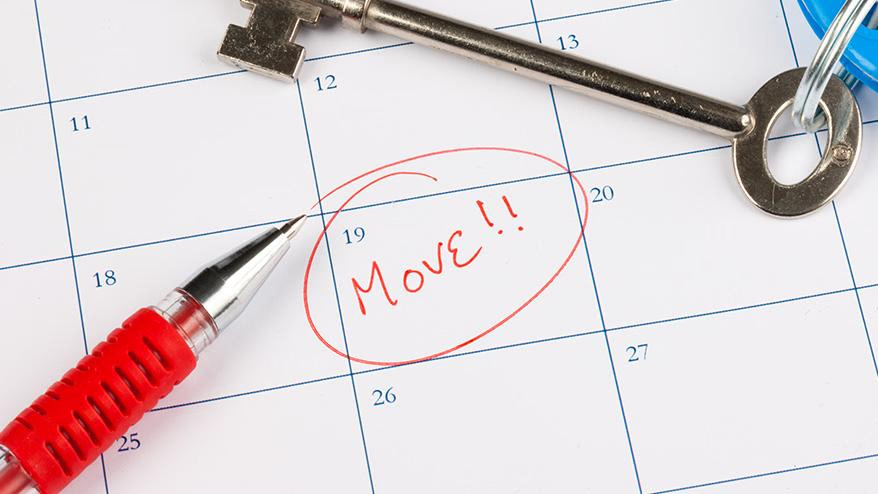こんにちは、ディレクションチームの中川です。
突然ですが、みなさんはライフイベントってどのように計画を立てていますか?
私事ながら、昨年末に引越しと入籍をしたのですが、その時に現在のディレクターとしての経験が役に立った出来事がありました。
普段は業務内でのディレクションの話がメインですが、今回は【番外編】として、私生活のディレクション体験についてご紹介したいと思います。
はじまりは、引越しに向けてのタスク整理から
入籍が決まり、人生の新しいスタートが決まりました。住んでいたマンションは一人暮らし用の部屋だったので、引越しも必要になります。
ただ、引越しと入籍をするにしても、初めての経験だったので何を進めたらいいのか分からず…。
引越の準備などのひとつひとつのタスクは何となく浮かぶのですが、とにかく大量にあって全体像が良く分かりませんでした。
ネットで調べてみても、ひとつひとつのタスクについては多く載っているのですが、その為に自分が何をする必要があるのかは、情報があり過ぎてよく分かりませんでした。
また、自分だけではなく相手との認識合わせや協業する必要もあるので、これらの「見える化」も必要でした。
そのとき、天の声ならぬ上司の声が頭をよぎります。
「まず、全部の項目を洗い出してみたらいいんじゃない?」
そうか…何をいつまでにやるかは、普段ディレクターとしてやっていることと同じ。
入籍も引越しも案件のように考えてみればいいのか!
こうして「引越し&入籍案件」が幕を開けました。
引越し&入籍までのタスクを洗い出して、WBSを作る
まずは、普段のディレクション業務のように、項目を洗い出してWBS(Work Breakdown Structure)を作ってみようと考えました。
※WBSの作り方については、大藪の『プロジェクトの見取り図、スケジュール表の作り方【超基礎編】』をご覧ください。

引越しと入籍に向けたWBS。
WBSの項目は以下のような例で作成しました。
-
大項目:引越し
-
引越し先
- 引越し先洗い出し
- 引越し先検討
- 内見
- 決定
-
引越し
- 解約通知書提出
- 引越し業者見積もり
- 荷造り
-
引越し先
-
各種手続き
-
引越し後
- 転入届提出
- 住民票変更(住所変更、世帯をまとめる)
- 免許の名前、住所変更
- 金融機関の名前、住所変更(個人) …など
-
引越し後
細かく洗い出していくことで、最終的に「大項目4個、中項目10個、小項目40個」というWBSが完成しました。
また、期間自体が1年程度かかるので、スケジュールの1マスは1日ではなく1週間にしました。
そこから、引越しまでの期間からその期間で何をすべきかを逆算して、WBSを作成しました。
引越しまでに「何を」「いつまでに」行っておいた方が良いかの目安ができたことで、「引越し先の物件を探し始める時期」や「住民票や戸籍謄本を取りに行く時期」などの、重要なタスクも余裕を持って進めることができました。
引越し後に買いたいものリストを作成する
無事完成したWBSをもとにタスクを粛々と進めていくなかで、また少し整理できないものが出てきました。引越しと共同生活が同時に始まるため、引越し後に買いたい物や買っておいた方がいい物が色々出てきたのです。
とはいえ、もちろん買いたいものを全て買うわけにもいきません。整理と優先順位付けをする必要があったので、課題管理表のような形で引越し後に買いたい物のリストを作成することにしました。

金額も入れておけば、予算も把握できます。
リストをそれぞれが入力した結果、買いたい物リストは合計20個程度になりました。
そこから、実際に買うものの優先順位を話し合って決めていきます。
例えば…
- ウォッシュレットが無ければ必須で欲しいと思っていたが、相手はそれほど必要だと思っていなかった。
- 一人暮らしのときには炊飯器を使わなかったので忘れていたが、必須で欲しいものだった。
こうすることで、「自分はこれを最優先で買うべきだと思っていたけど、相手の考えは違った」などの、認識のズレを防いだり、買い漏れを減らしたりすることができました。
業務経験も使い方次第で、私生活に活かせる
いかがでしょうか。
「ディレクション」という言葉を聞くと、業務的なイメージが強いと思います。
たしかに、普段社外や社内で行っているようなディレクション業務はあまりないかもしれません。
チーム内の他のディレクターにも、私生活でディレクション的なことをやっていないか聞いてみたところ、
- 「タスクを紙に書き出すなどはするが、WBSや課題管理表などを作ろうと考えたことはなかった。」
- 「そもそも、業務のディレクションを私生活で行おうという発想はなかった。」
という意見が多かったです。
私たちの普段の生活もディレクションを行う機会はたくさんあり、もしかしたら、無意識にやっているけれどディレクションだと意識していないだけの可能性もあります。
もし「◯◯をやろうと考えているけど、何からやったらいいのか分からない…」と考えている方がいらしたら、まずはWBS(スケジュール)を作ってみると、今まで見えなかったものが見えてくると思いますので、ぜひ試してみてください。

